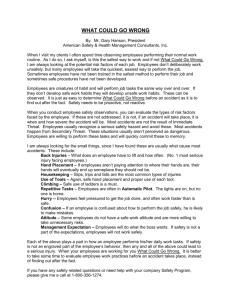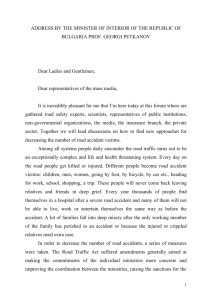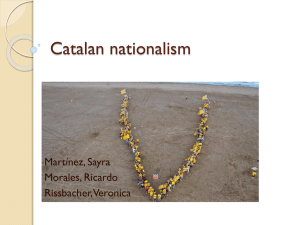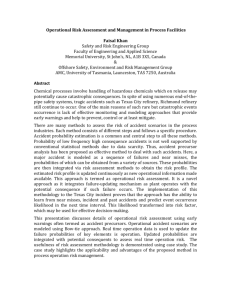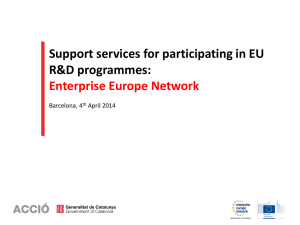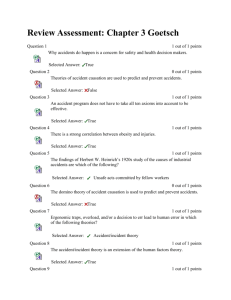Home Affairs Minister calls for a common and unified European
advertisement
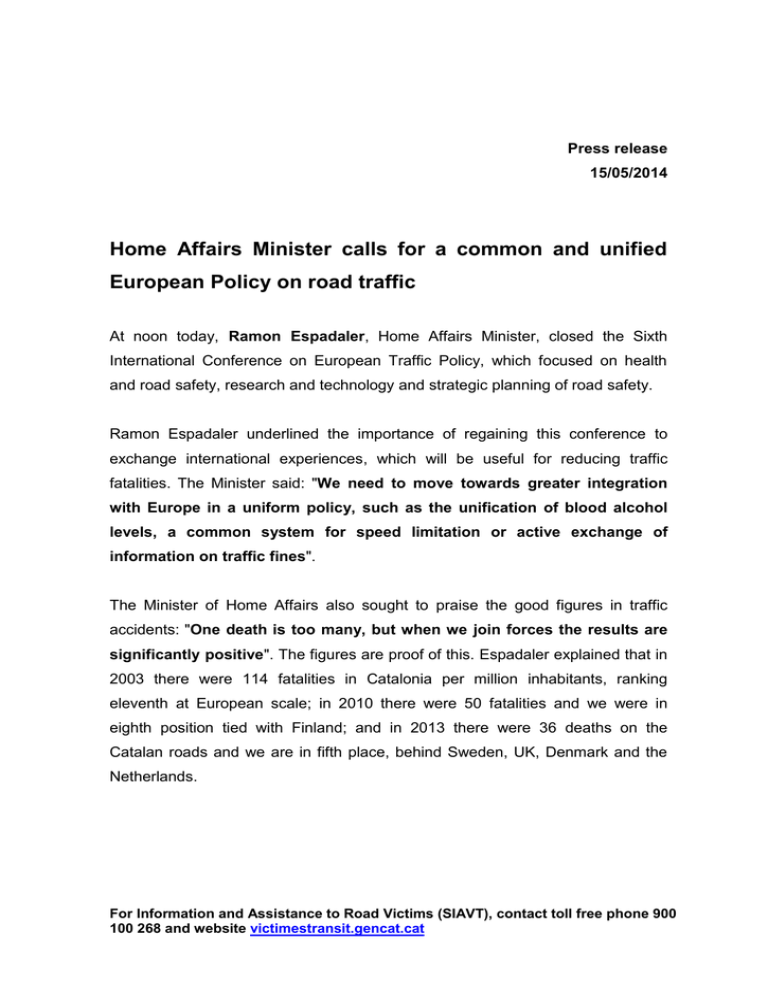
Press release 15/05/2014 Home Affairs Minister calls for a common and unified European Policy on road traffic At noon today, Ramon Espadaler, Home Affairs Minister, closed the Sixth International Conference on European Traffic Policy, which focused on health and road safety, research and technology and strategic planning of road safety. Ramon Espadaler underlined the importance of regaining this conference to exchange international experiences, which will be useful for reducing traffic fatalities. The Minister said: "We need to move towards greater integration with Europe in a uniform policy, such as the unification of blood alcohol levels, a common system for speed limitation or active exchange of information on traffic fines". The Minister of Home Affairs also sought to praise the good figures in traffic accidents: "One death is too many, but when we join forces the results are significantly positive". The figures are proof of this. Espadaler explained that in 2003 there were 114 fatalities in Catalonia per million inhabitants, ranking eleventh at European scale; in 2010 there were 50 fatalities and we were in eighth position tied with Finland; and in 2013 there were 36 deaths on the Catalan roads and we are in fifth place, behind Sweden, UK, Denmark and the Netherlands. For Information and Assistance to Road Victims (SIAVT), contact toll free phone 900 100 268 and website victimestransit.gencat.cat The Home Affairs minister stated that the way forward is to join forces: "We want to learn from the experiences of other countries and show what experiences have worked for us". "We must work hand in hand to reduce the number of fatalities", he added. Meanwhile, Joan Josep Isern, director of the Catalan Traffic Service (SCT), focused his presentation on the 2014-2020 Road Safety Strategy in Catalonia. A Commitment to Europe. Isern stated that "the 2014-2020 Road Safety Strategy, led by the SCT, wants to become a reference at Europe’s service in matters of road safety". Moreover, he also mentioned that, wanting to achieve 50% reduction of fatalities compared to 2010, "the plan is based on four main issues: the involvement of public and private entities, furthering an ongoing road safety which takes into account urban and interurban areas in connection with municipalities; research, development and innovation in benefit of road safety with the collaboration of universities; and offering users life long learning and training on safe mobility". Concerning these priorities, he emphasized some suitable measures such as forming working groups to address specific issues (work-related mobility and motorcycles); local Road Safety Plans and the creation of a road safety observatory; the creation of chairs to find solutions to road safety problems; and awareness programs targeting youths, such as "Gear Shift" and "Game Over" and training motorcycle riders from age 16 with A1 license, among others. Conclusions of the sixth Conference Oriol Amorós, President of the Road Safety Study Commission of the Parliament of Catalonia, drew up the conclusions of the Conference and underlined that during the symposium "many lines of work were revealed that must also converge at a continent level". In this regard, he pointed out that the For Information and Assistance to Road Victims (SIAVT), contact toll free phone 900 100 268 and website victimestransit.gencat.cat round-table on road safety in the workplace served "to highlight the need for traffic is not a stranger to working conditions and must go for a modal shift in favour of safe, collective and sustainable commuting". Regarding the round-table on education and formation, Amorós said that "the main conclusion to be drawn is that Catalonia and Europe must make a firm commitment to include education for safe mobility in all the mandatory training processes, but not as a subject." As for the last round-table yesterday, on vulnerable groups, the president of the Road Safety Study of the Parliament mentioned that "he had taken as a reference a great many international proposals for the peacekeeping and protection of vulnerable groups, one of the challenges that Catalonia and Barcelona have with the motorcycles, one of their main targets for reducing accident rates". Of the round-table on health and road safety, Amoros stated that "it is evident that driving under the effect of drugs and alcohol is still a scourge at European level, but from the autopsies of road accident victims, an increasing use of psychotropic drugs can be seen. This does not mean at all that the ingestion of such medications are the cause of the accidents, but it is a sign of what we must work on. The big shift is to get health authorities and physicians in particular (and why not laboratories too) to take on the task of informing the public of the risks associated with the use of these substances". As for the round-table that focused on the contribution of technology to road safety, according to Amorós, "it highlighted the need for an urgent implementation of such technologies" and he went on to mention in relation to the round-table on the strategic planning of road safety, that have had access to the strategic plans of Denmark, Ireland, Spain and Catalonia, which overall, "allow us to ensure a road safety vision at medium and long term that we all agree must have a multiple action on all mobility stakeholders of the road network. We cannot leave a single element or a single perspective to chance, because the zero trend target is very clear, it already has an fully European For Information and Assistance to Road Victims (SIAVT), contact toll free phone 900 100 268 and website victimestransit.gencat.cat scope, and we will only move forward if we put together all the policies of each country and act hand in hand". Finally, Amoros said "if there ever was a consensus policy in Catalonia, that is the policy of road safety". Health and road safety, research and technology and strategic planning of road safety are the focus of the second day of the VI International Conference on European Traffic Policy Health and Road Safety The first round-table on the second day focused on health and road safety. According to the World Health Organization, every year some 1.3 million people die worldwide as a result of road accidents, and in Europe some 28,000 people. This data indicates the serious public health problem involving accidents with fatalities for all societies. Bartolomé Vargas, public attorney Coordinator of Road Safety at the Supreme Court of Justice, the debate moderator, said that "road accidents are a pandemic affecting health, welfare, the psychological state and with far-reaching effects". Moreover, he also pointed out that "the legal framework still gives plenty of room for finding tools to control the abilities of drivers, while respecting data privacy without necessarily leading to the withdrawal of the driving license." Dr. Miquel Casas, Department of Psychiatry, Vall Hebron University Hospital, Autonomous University of Barcelona (UAB), has talked about the Incidence of Psychopathological Disorders in Infringement Cases and explained that "a lot of traffic offenders have not been diagnosed with attention disorders, behaviour, sleep, chronic fatigue disorders or addiction to alcohol and drugs, which are all common factors observed in these cases. For this reason, there are no detection protocols designed for psychopathologies that would help to prevent accidents on public roads". For Information and Assistance to Road Victims (SIAVT), contact toll free phone 900 100 268 and website victimestransit.gencat.cat Ilyas Daoud, Project Manager (ETSC), Belgium, focused his presentation on The Implementation of the Alcolock as a deterrent measure. In this regard, he has warned that "in the European Union, 2% of users of public roads have an illegal level of alcohol". Moreover, he added that "the cause of 11% of traffic fatalities out of a total of 28,000 deaths in the EU is also alcohol, according to member states". With this in mind, Daoud, warns of the need for 0 tolerance in connection with alcohol and driving, for the intensification of laws for which a minimum number of controls are established to detect its consumption and for the implementation of a program of controlled driving using the alcolock. " Efe Rimoldi, member of the Executive Board of MOVING International, Germany, reflected on Medical Check-ups for Drivers. In her presentation, she stressed that "we must use science in our favour, know ourselves and thus enable us to move about the road scenario responsibly and ethically". She also mentioned that "given the increasing use of psychotropic drugs, it is very important that we ask ourselves and inform ourselves about the effects they will have on us and on our driving". Dr. Josep Serra, High Resolution Center of Vila-seca, Catalonia, explained a proposal for an Integrated Management System of Road Disability (SIGIV) for the reduction of accidents linked to psychophysical factors. Regarding his proposal, he explained that "the idea would be to have some sort of terminal providing realtime data, that would allow to report that a driver who is specifically affected by a health problem such as a stroke, has just had a road accident". In Serra’s own words, "thus there would be relevant medical information online that would clarify the cause of accidents and also prevent them". Lastly, Antonio Gómez Hazard, MD, member of the Working Group on Preventive Activities SEMERGEN, presented a lecture on Prescription Drugs and Driving. Eighteen diseases that can affect driving. Gomez warned that "in most cases, the patient is uninformed about the effects of prescription drugs, that can be sedative, stimulant, or cause drowsiness, blurred vision, spasms or restlessness among others". This is why he insisted that "GPs should be made to For Information and Assistance to Road Victims (SIAVT), contact toll free phone 900 100 268 and website victimestransit.gencat.cat collect driving habits in medical records, specify whether as physicians they advise against driving, assess how the medication may affect driving, prescribe safe medication and drugs that least alter drivers’ awareness, and above all, inform patients of possible side effects", among other things. Research and technology applied to road safety Research and technology applied to road safety: today the focus of the second round-table debate was on elements such as road infrastructures or active and passive vehicle safety systems. In this regard it was noted that they have become a tough present and future challenge for reducing accidents, preventing serious injury and also improving traffic management. Pere Macias, president of the Parliament’s Road Safety and Sustainable Mobility Commission, introduced the debate on research and technology applied to road safety stating that "with accidents, there is never a single factor responsible but rather a correlation between factors such as road, driver and vehicle, among others". Antonio Perlot, public affairs manager of the Association of European Motorcycle Industry, ACEM, gave a lecture on Development of ITS Technology, Current Challenges and Future Prospects. During his speech he mentioned that "The ITS --Intelligent Systems of Transportation-- must be an integral part of future mobility plans" and for this reason, he explained that ACEM members are actively involved in research projects to promote improved safety". Adrià Ferrer, project engineer, Passive Security, IDIADA, Catalonia, focused his speech on the Evolution of Security Systems for Motorcycle Users. During his speech, he offered an overview of the different types of systems and stated that "in Spain, we are pioneers in protection systems for motorcycle users in the infrastructure. Related to this and unlike the rest of European countries, we have a law that regulates them." For Information and Assistance to Road Victims (SIAVT), contact toll free phone 900 100 268 and website victimestransit.gencat.cat Jacqueline Lacroix, Head of Unit of the German Road Safety Council (DVR), spoke about the Development of ITS in Germany – Promoting New Technologies to Increase Users’ Safety, Lacroix focused primarily "on advanced driver assistance systems, called ADAS, which have great potential when it comes to achieving more road safety". Miquel Nadal, director of the Department of Foundation and International Relations of RACC, gave a speech on the Development of ITS in Spain. Nadal stressed "the importance of new technologies in reducing accidents and casualties --specifically, 1% a year". Moreover, he warned that "the vehicle fleet is aging at a dramatic rate which has a drastic impact on accident rates and, in view of this, the fleet must be renewed". Pedro Mondelo, Director of the Specific Research Center for Business Improvement and Innovation –CERpIE-- at the Polytechnic University of Catalonia (UPC) focused his presentation on The Technology Applied to Comprehensive Road Safety. Mondelo underlined that "the automotive industry has done very interesting things in terms of correcting people’s limitations when commuting and these elements must be considered in overall vehicle design". Lastly, Francisco Cermerón, head of the Central Area of Accident Investigation of the Mossos d’Esquadra Police Force, detailed the ATENEA project. Comprehensive Accident Management. Thus, he explained that the Mossos manage information regarding 22,000 accidents per year and that this system aims to integrate and structure all the information in order to optimize it for potential recipients (insurers, Catalan Traffic Service (SCT), etc). Cermerón explained that "the first part of the project, which will be based on an open source system, has already been developed and will be operational in the first half of June". Strategic planning of road safety The last round-table of the Conference addressed the strategic planning of For Information and Assistance to Road Victims (SIAVT), contact toll free phone 900 100 268 and website victimestransit.gencat.cat road safety. The European Union has set the goal of achieving the strategic vision of zero road safety by 2050, which aims to reach zero fatalities and serious injuries with life-long disabilities. One of the measures recommended by the EU to achieve this long-term goal is to develop strategic road safety plans. Indeed, the Servei Catala de Transit (SCT) has promoted this year's first Strategic Road Safety Plan, specifically for the period 2014-2020. Antonio Avenoso, Executive Director of the ETSC, Belgium, moderated this round-table and stated that "road safety must be a responsibility shared by politicians and administrations responsible for infrastructure, the industry involved and civil society". Michael Rowland, director of Road Safety Research, Irish Road Safety Authority (RSA) focused his speech on the Strategic Plans for Road Safety in Ireland and explained that "the RSA has set the target by 2020 to reduce traffic accident fatalities to 124 or to 25 victims per million inhabitants". Moreover, Rowland also explained that his agency "wants to end the complacency of citizens who believe that we have already achieved all we can in reducing road deaths and harmfulness." Jesper Solund, documentation director Danish Road Safety Council offered a lecture on strategic planning for road safety. Solund started explaining that 2013 was a particularly good year in Denmark, "not only because it was the 25th anniversary of the first national action plan for road safety, but also because record levels were achieved in reducing fatalities and injuries. In this regard, he explained that from 2008 to 2013, they were able to reduce fatalities by more than 30%". Maria Segui, Director General of Traffic, Home Affairs Ministry, spoke about Strategic Planning at the Directorate General for Traffic. To start with, she explained that, "according to a WHO report of 2013, Spain was among the top 20 countries, of the 180 evaluated, in terms of road safety. Still more work is required on the Strategic Plan 2011-2020 ", especially considering the context in which society is aging and the average vehicle is 12.3 years old, which may triple For Information and Assistance to Road Victims (SIAVT), contact toll free phone 900 100 268 and website victimestransit.gencat.cat the possibility of an accident. Segui underlined, among other focuses of attention for the coming years, the need to continue improving the legislative framework, education, formation and recycling of knowledge, ensuring certain psychophysical ability of drivers, work-related risk factors such as speed, alcohol and distractions, control and promotion of passive safety systems, addressing the problem of conventional roads, which triple the chance of an accident compared to highways and freeways, maintenance and renewal of the fleet, and also promoting the rationalization of the number of motor vehicles and the commutes we do". Top awards for road safety The First Road Safety awards were given during the Conference and granted to civil society organizations and institutes linked to the world of traffic and road safety; journalists in the field of road safety and mobility; road safety attorneys of Catalonia and the former directors of the Road Safety Institute and former directors of the Catalan Traffic Service -SCT. For Information and Assistance to Road Victims (SIAVT), contact toll free phone 900 100 268 and website victimestransit.gencat.cat
